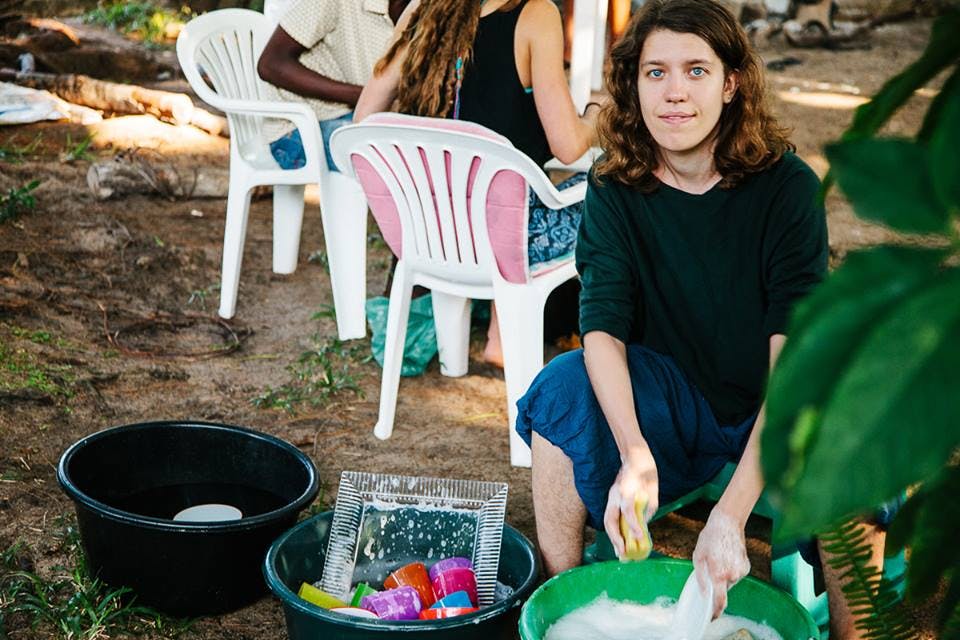everyday life : \ Doing the damn (ecological) dishes
I don't like doing the dishes. It's a chore I prefer to postpone, until my mountain of dishes reaches the cupboards or until I run out of clean cutlery. Even then I need to force myself to actually start. Lately I've found it easier if I put on some music or a good podcast about the beauty in life – then I can cry a bit and be fascinated about the greatness of life, instead of wallowing in my guilty concience about my dish washing habits. But this is not what this text is about. Because even in the more mundane and dull parts on life, we're faced with choices, history and details that invite one to investigate, reflect and get nerdy.
So I preach and I think a lot about living in an ecolocigal, or sustainable, or enviromentally friendly way, or any other chioce of words you'd want to apply to anyone whose life plays out in the midst of a cilmate crisis. Some years ago I started specifically thinking about the every day life chore of doing the dishes, and some things immedieately stood out to me. Things that I had never questioned, but always taken for granted in my dish-related choices:
– The tools needed for wash-up. I noticed tha I had never seen a single dish brush that wasn't made of plastic. The same went for sponges and dish rags when I came to think of it. If I wanted to live a life more free of plastics, what were my alternatives when it came to washing the dishes? I'd always used these tools, from domestic class in school to my first own apartment. But did I really need to? And what were the alternatives, if not plastic?
– The washing-up liquid. All cleaning agents I'd ever used for washing up would come in liquid form inside plastic containers. Some had glaring colours, others not. Some were eco-labeled, but what was actually in them? And what was their function? What function did I need? A friend of mine once mentioned that all washing-up liquids contain surfactants, and that these tend to damage water living organisms. Without much further consideration at that time, I reacted in fear and directed my attention instead to finding alternatives to commercial washing-up liquids – but what were the alternatives? And what had people been doing before the commercial washing-up liquids entered their homes? How have kitchen utensils been cleaned throughout history?
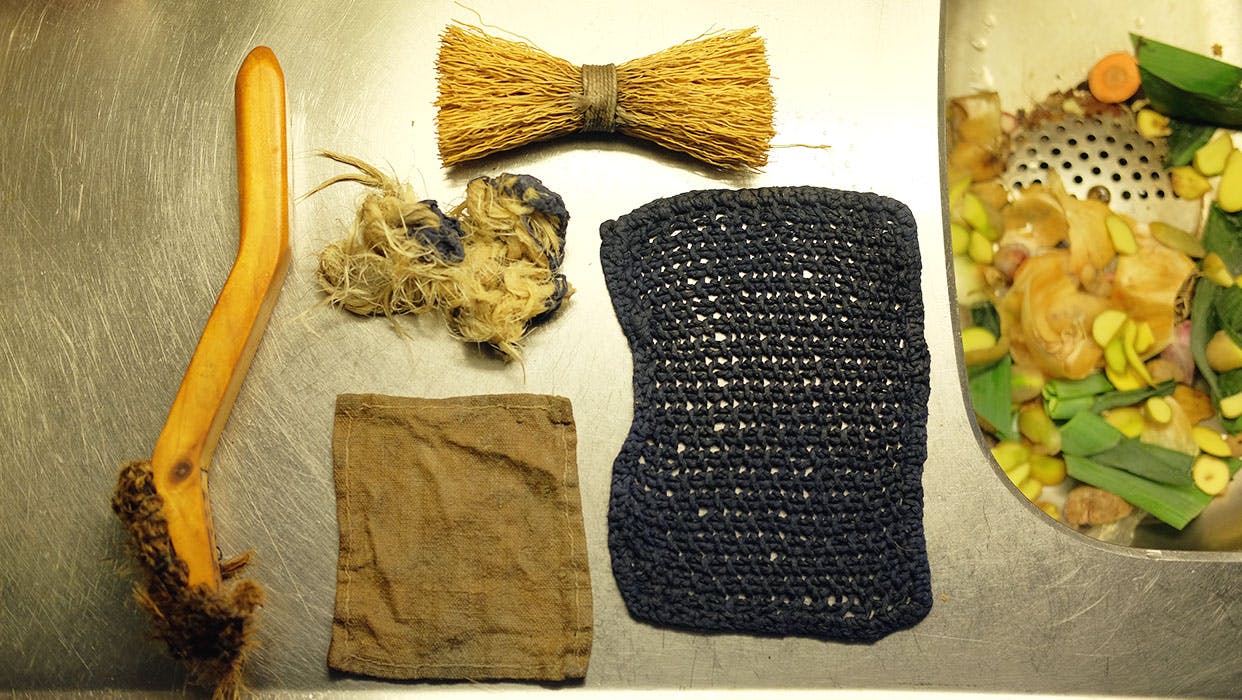
Today it's just about two years since I started asking myself these questions, and I have found answers I'm happy with for the moment. During these years I have always washed my dishes by hand, so my answers don't apply to dishwashers. Below are my thoughts from my experience by the sink, my practical solutions and other thoughts I bring with me.
I organize my thoughts into four categories:
– Freedom from plastics
– Energy efficiency
– Sustainability
– Hygiene
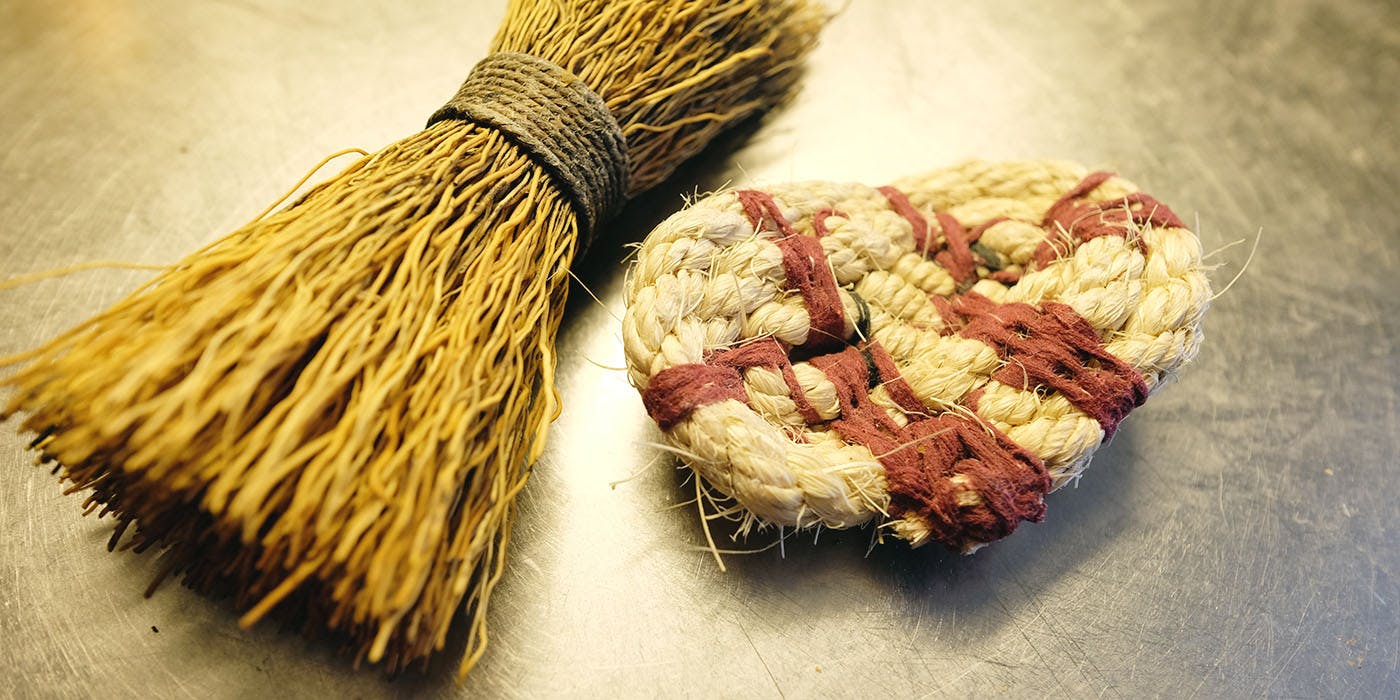
Freedom from plastics
To avoid plastics as much as possible relates to enery efficiency and sustainability. Plastic (almost) always comes from fossil sources and usually requires even more fossil fuels for extraction end refinement. Very few plastics are recycled for materials, which means that most plastics are burned when discarded which then further adds to accumulation of CO2 in the athmosphere. One can certainly calculate the amount of times or years a plastic product should be re-/used in order to ”make up” for this, but I don't want to – our misuse of plastics depresses me, and if I can avoid contributing to humanitys plastic cycles, then I will. Every time.
Energy efficiency
Here I am mindful of the energy needed in the washing-up process itself through variables such as how much hot water I am using, but I also consider the energy needed to enable the washing-up in the first place: how the tools for the washing-up are produced, what they're made of and where they're from. Metals require a lot of energy in the process of extraction and processing, so I use them sparingly or skip them altogether. Transports are another thing I consider – where does the stuff come from? It's obvious that energy is needed in order for me to have the tools I need, but I try to be mindful of where they come from and make the most use of the stuff before I discard them.
Sustainability
Sustainable is that which we can do forever without using up the resources – this is at least a way in which David Attenborough phrases it in his film Life on Our Planet. When I choose the materials to my tools for washing up I think about sustainability; a rag made of cotton yarn, a sponge made of sisal or roots is far more sustainable than the plastic alternatives, because the plant fibres will re-grow. The same goes for the cleaner: which cleaning agents can we put through our water treatment plants, and which cause the least damage to our water living organisms and environment when reaching the other side? We flush huge amounts of cleaning agents down our drains every day, so of course our choices here make a difference. And here we arrive at the topic of surfactants, perfumes and other chemicals that the cleaners consist of. Nowadays there are EU-directives regarding which surfactants are allowed to be used in cleaning products. These surfactants should be easily degradable, but even so it is hard to know which surfactants are included in the liquids, and what they degrade into. So I find that the gentler cleaners I use and the lesser I use them, the better for me and the environment in the long run. I try to chose ecolabeled brands with labels I trust, unless I make the cleaner myself. More on that further down.
Hygiene
And so to the category that is the most obvious for me in my every day life: that the dishes that I wash actually get clean by me washing them. For that, my cleaners and tools need to be adequate for the job, preferably so that I can get the job done in a relatively fast and energy effective way, but it's also about my methods of washing. To clean the dishes, I need to know what the dishes need to be cleaned from and how I'm to clean them: is it enough to simply scrub hard? Or should the dish also be heated, soaked or dried out?
The main problem when cleaning dishes are fats. Starches and carbs are easy to basically wash out, the same with proteins, but fats become a problem because fats aren't water soluble. That's obvious, but I don't want to solve the problem simply by using more washing-up liquid. Instead I also try to prevent the problem of even having to wash fats, for instance by doing a better job of emptying the containers. To know which types of fat you're trying to wash away also makes it easier; coconut oil becomes liquid at around 35-40 degrees, so using hot water makes washing it away easier. Other fats may need even more heat or more scrubbing from my part to move.
People before us have cleaned their food utensils for thousands of years. The way we wash our dishes today is very new, and also very specific to the West. My biggest learnings of washing up come from talking to people and, above all, by doing the dishes with people.
When I've travelled to Mozambique I've washed the dishes in plastic tubs full of soapy water – just like at home, except for when the bottom of the big pot was to be made clean from soot. The food was cooked over an open fire, so to clean the soot one of the women showed me how to take a handfull of dirt and ashes and scrub the bottom of the pan, hard. I scrubbed and scrubbed, but after a while, the women laughed and the woman who had showed me the method took the pot from my hands and finished the job. She scrubbed harder than I could. The soot came off with the dirt, and the pot was ready to be used for the next meal.
My mother, who is grown up on the countryside in the former Soviet suprised me one day with a gift from Estonia. It was a bag of yellow powder I had never seen before: it was mustard powder. We had spoken of doing the dishes, and she remembered that in her childhood, the washing-up was made with a tablespoon of mustard powder in hot water. This was before brands like Fairy was a thing and when I tried her method I was surprised over how well it worked. I had thought that a ”primitive” method like this wouldn't be able to match a modern cleaner, but I was wrong.
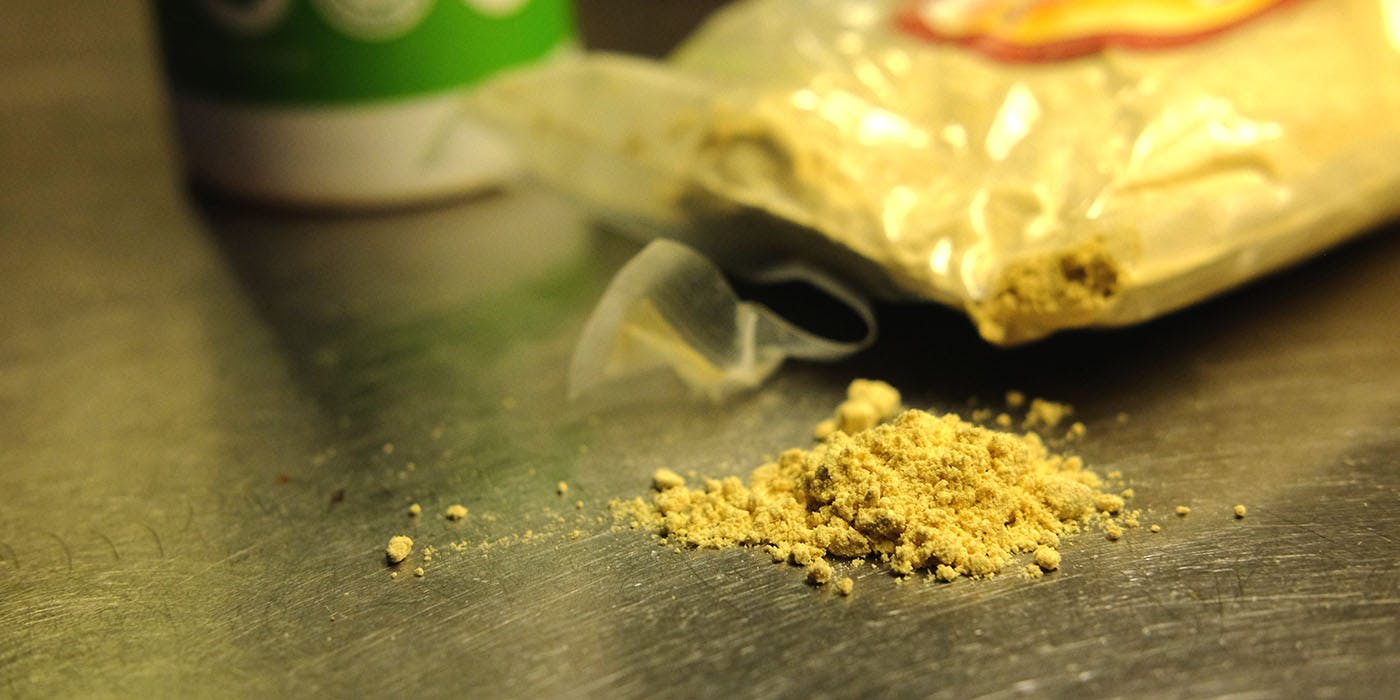
Another friend gifted me a small washing-up brush that he found in his fathers home. The brush was made of a kind of root, and the logo to a known department store on the package looked very retro. No matter how I've searched or whom I've asked, I still can't find what sort of root this little brush is made of. In any case the brush is both cute and practical, maybe not best suited for rigorous scrubbing but definetely good for washing-up in general, and it has a long durability.
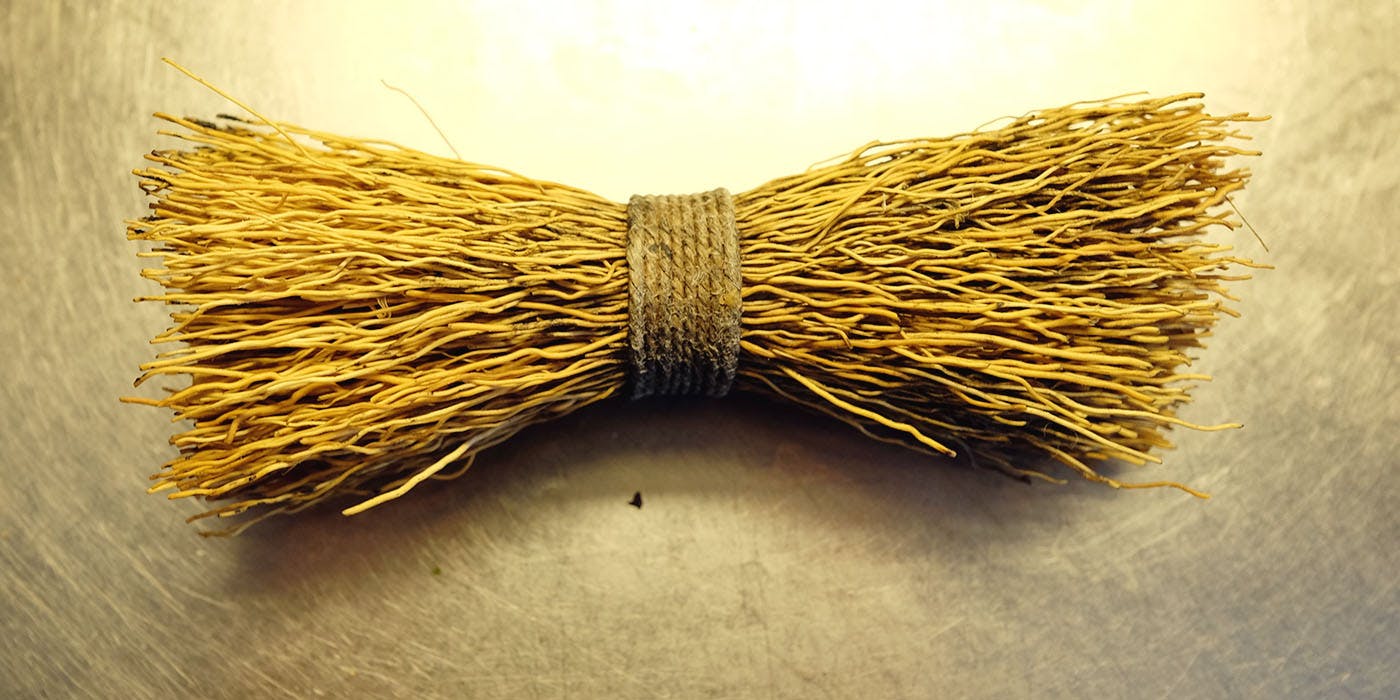
So, the scrubbing. An unrelated thought I happened to have at the same time as I was pondering plastic-free washing-up was if it would be possible to knit or crochet using coconut fibre. For those who haven't handled coconut yarn or -string, I can say that it's a sharp, hard and stiff fibre. Usually it can be found in garden stores. I had come over a piece of coconut yarn and I knitted a little shape – it worked! In some hours I sawed a handle from a piece of wood, attached the knitted shape with some linen string, proofed the handle with linen oil and had my first ever dish brush made of 0% plastic. I admit: the whole thing was fairly ugly and awkward to manage (product design is not my strong side), and the hook in the end came off in two days or something like that. But it was water resistant, the linen string was strong for holding together the handle and the scrubby part, and that coconut fibre sure could scrub!
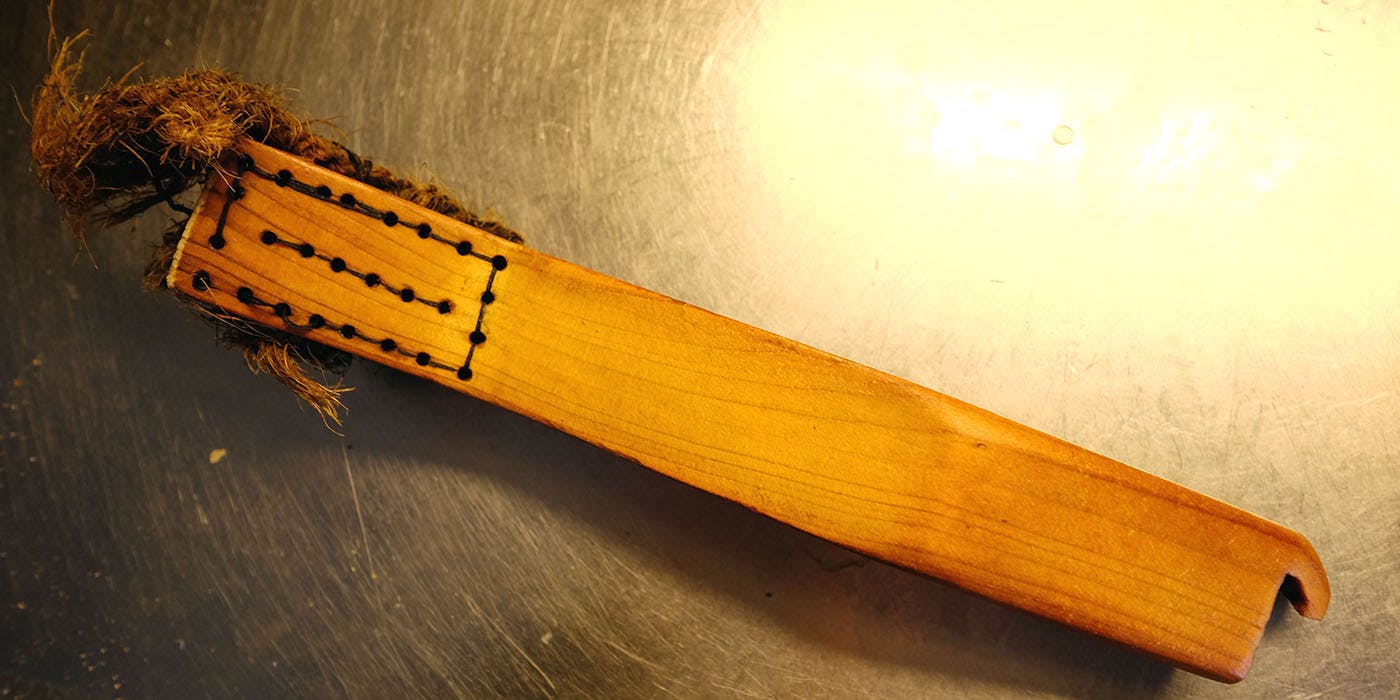
Two years later, and I prefer sponges and rags for washing, but as soon as I need to scrub my cast iron or oven pans from burned stuff, this is the tool I use. One of the seams has come off, making the
end a bit floppy, but it still scrubs everything I manage to burn.
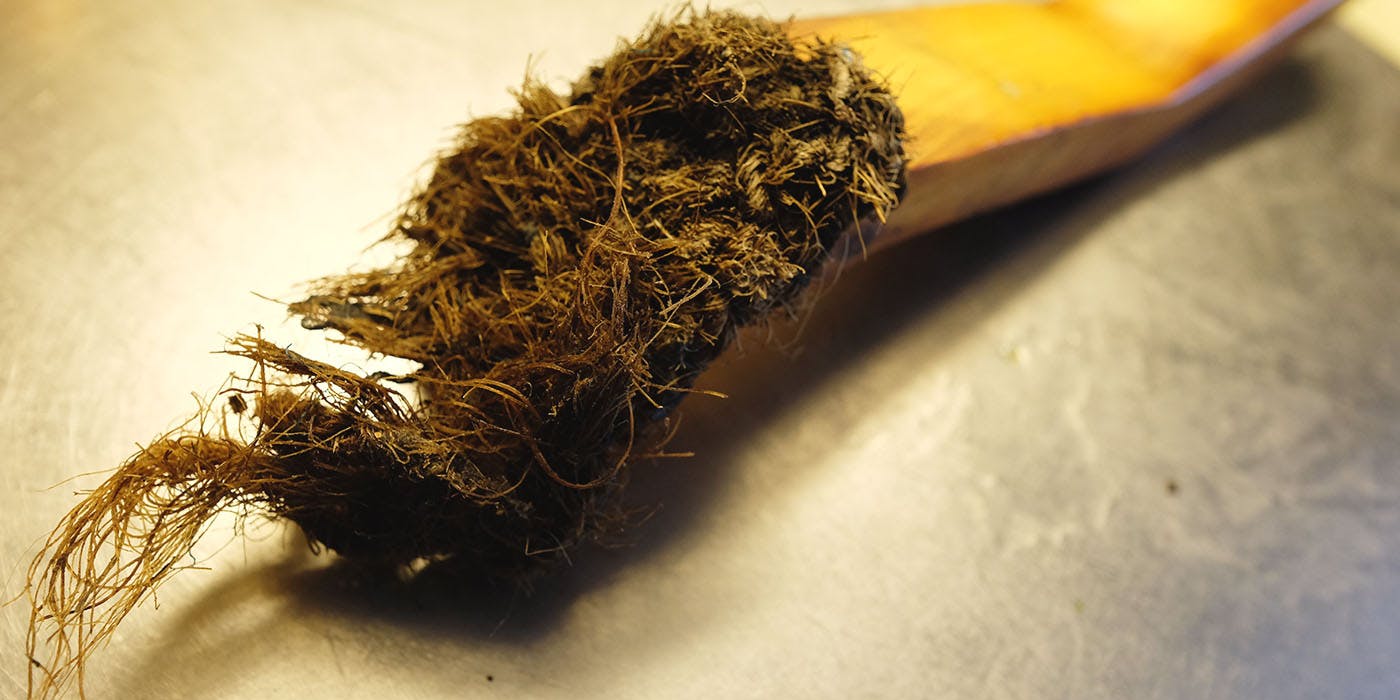
Completely excited about the success with the coconut fibre, I started trying out everything I could find: cotton yarn became knitted dishrags and I tried different patterns and firmness to get different surfaces on the rags. Sisal was a fibre I happened to have a lot of – it's also a natural fibre and can be found in hardware- or marin stores. A piece of sisal rope became the next scrubbing sponge, and some loose sisal fibre I'd found at a thrift store (the kind used for window sill decoration) became a tightly sewn bundle, also used for scrubbing.
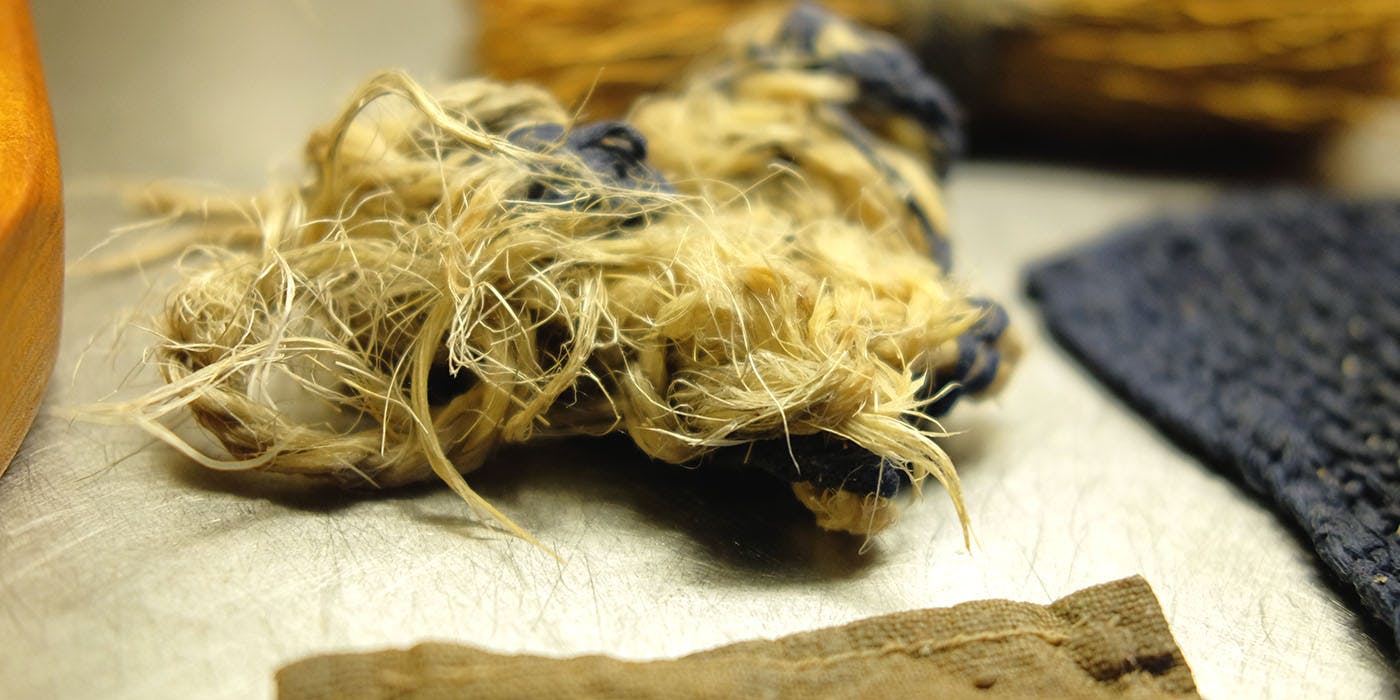
It is this latter one that became my favourite and I used it daily (or however often I did the dishes) for almost two years before the fibres got worn down and the thing fell apart. Nowadays I do all my scrubbing with a cotton dishrag (the blue one) and I use another cotton rag to wipe the surfaces (the red one). Even though I've been using these for several years, they haven't started to smell weird or become slimy in the way that plastic kitchen rags often do. I let them dry out after each use and once in a while I throw them into the washing machine. But the thing that still amazes me the most is how durable these fibres are and what a good job they're doing: a properly knitted or crocheted structure seems to be able to withstand hard wear for a long time, at the same time as the surface structure is able to absorb fats and scrub away all food remains.
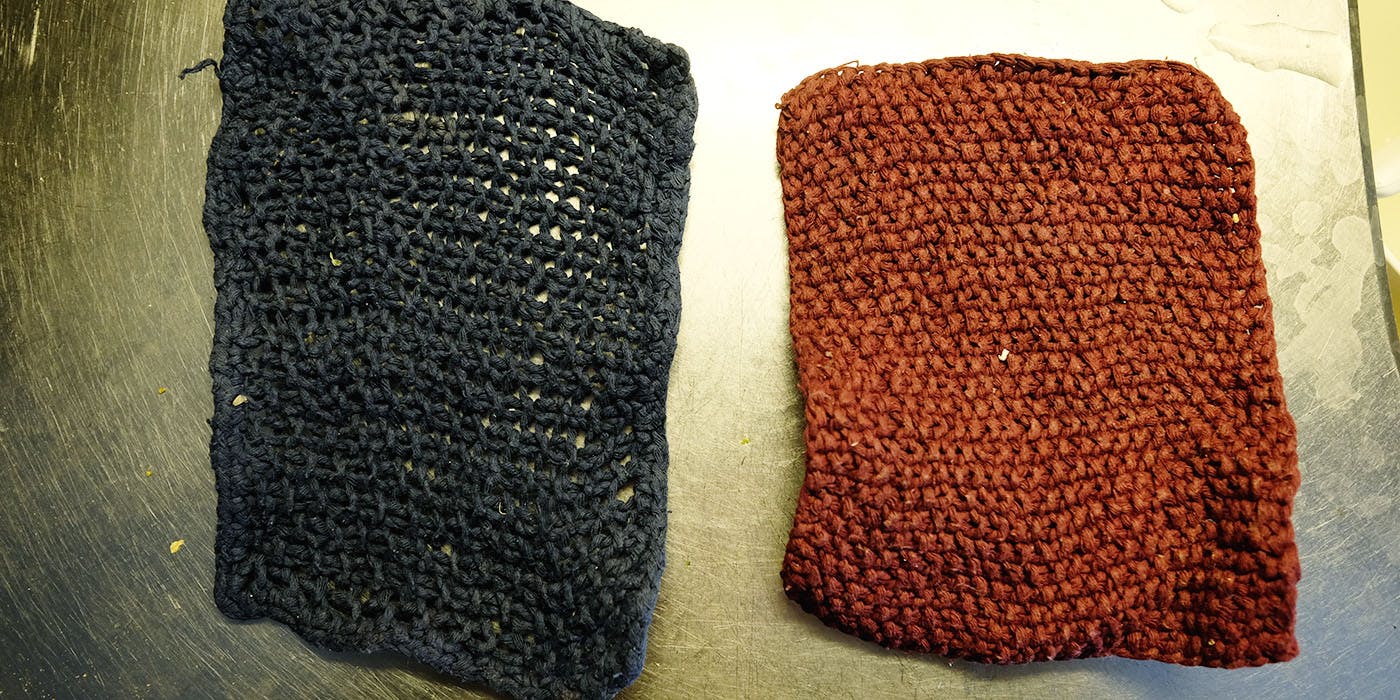
I also started experimening with different cleaning agents. Mustard powder worked well, but it had a strong smell and didn't work quite as well in cooler water. I used soft pine-oil soap for a long time – it feels much more gentle and the fact that it's made of pine oil gives me a sense that it should be more easily degradable, even if I haven't confirmed that. Later I started making my own cold processed washing-up soap. With an easy recipe as a basis I've tried different variations, and in my soap I now use both mustard powder and coffee grounds. This is what I use today. I grind the soap into flakes and mix them with water, which then becomes a concentrate that I dilute in hot water. The soap also works well in cooler water, but it's better when warm. The smell of the mustard powder is rather nice when in the soap, the coffee grounds add a scrubbing effect and even if the mix doesn't look especially appetizing, it does its job very well.
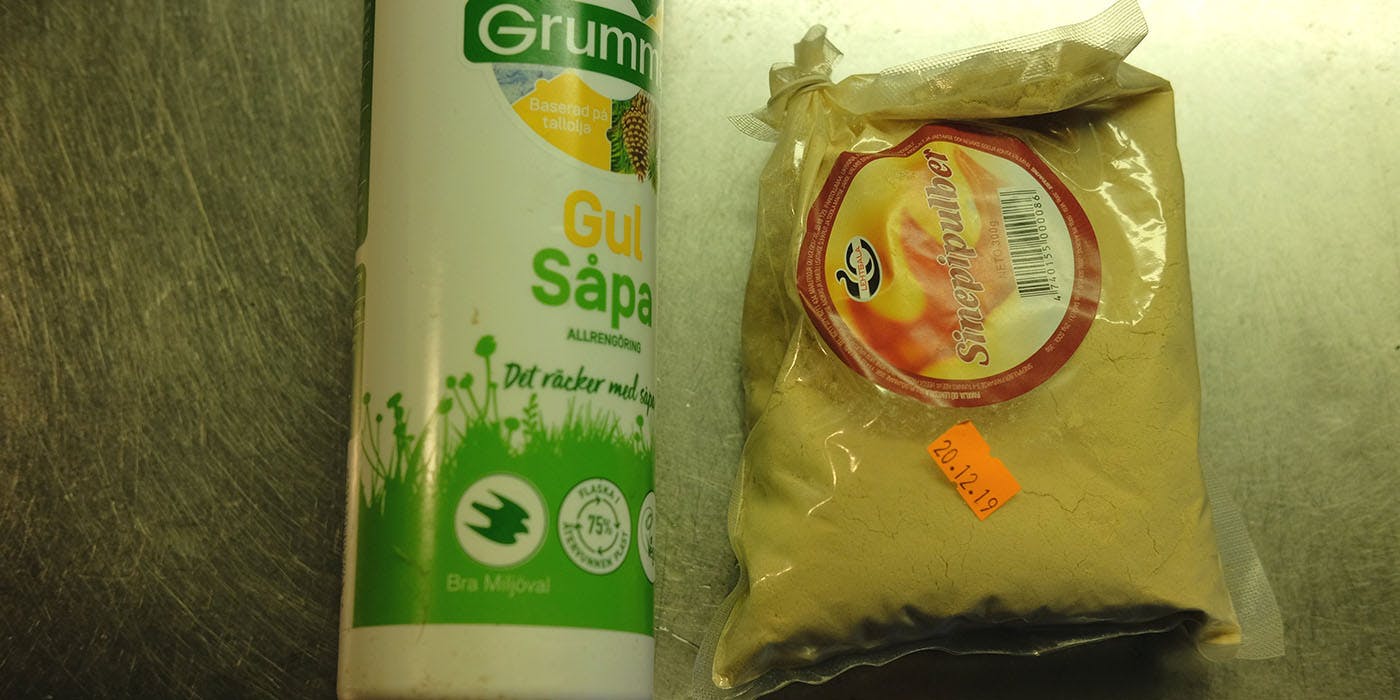
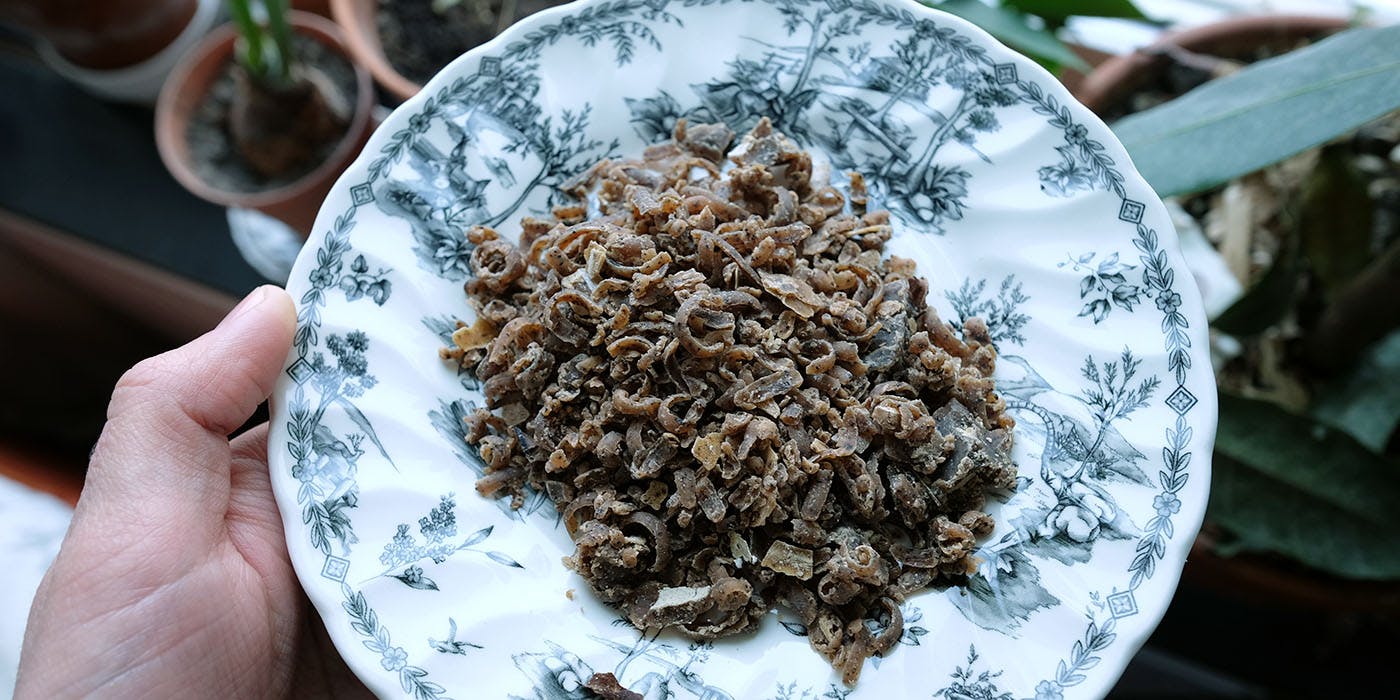
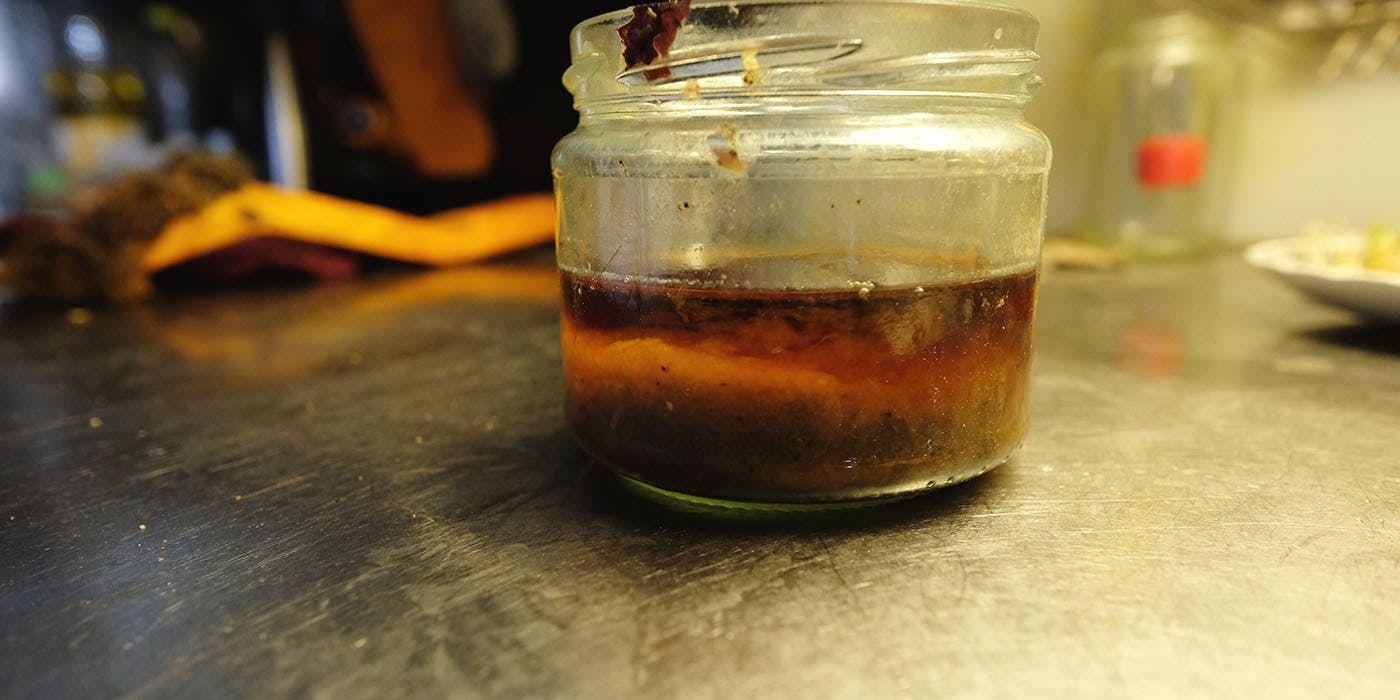
I'd never before really considered which material collaborations are needed to support my everyday life and this process has been both informative and empowering: through this process I've come to better understand what I need for this part of my life, and how I can source it myself. I've begun to ask myself whether I actually need all the stuff that I've been taught to need, and by getting to answer ”no” to these questions to an even greater extent, I find a sort of hope: I'm less dependent of the cycles of plastics, the transports and the values that I experience as unsustainable. Suddenly I can make choices that I believe in.
We have built ourselves into so many complex systems, all dependent upon each other. We've learned so much during our lives, things that we take for granted and which in turn are dependent upon these complex systems. But the earth is burning, and we need to make choices. We have to stop doing a lot of things, and a lot of those things are what we today view as obvious and correct. But we have to. I also believe that as we start to unravel the systems, we'll find that we can supply ourselves with a lot of the things that we rely on. Our hands have the ability to solve the same problems as people have for generations before us, and we will not perish. We're made for this.
I will probably never start liking doing the dishes, I'm sure of it. But I like solving problems, and I find a greatness in relating to human history over places and time. My favourite way of doing the dishes will always be scrubbing with dirt and ashes, on the ground and under the open sky, undoing the wear that the utensils will withstand again and again, and I like doing this together with others. We will never escape the fact that we need to work hard in order to maintain our living, but it's nicer to work together.
